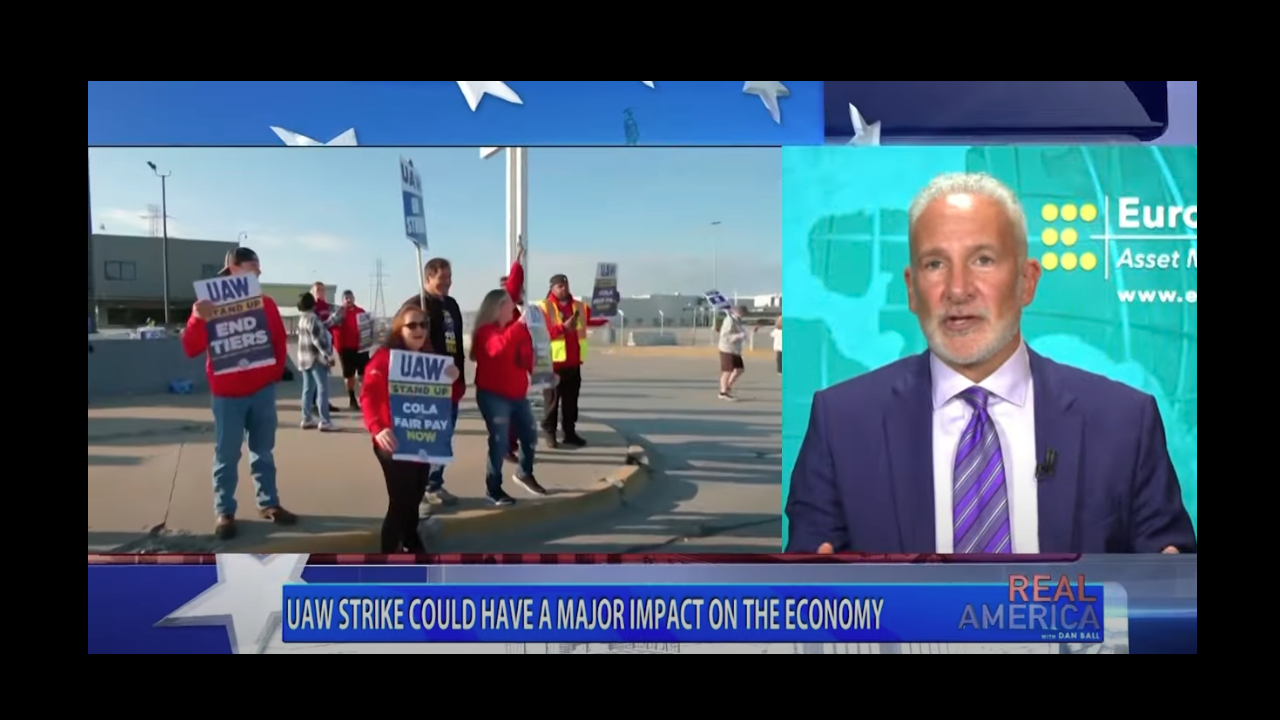Peter Schiff Puts the UAW Strike in Its Economic Context | SchiffGold

The United Auto Workers went on strike against the Big Three US automakers in Detroit last week. Peter Schiff went on Real America with Dan Ball to talk about the strike and how it might impact the US economy.
Peter put the strike in the context of the current inflationary and high interest rate environment, and talked about how it might impact the broader US economy.
This is the first time the UAW has gone on strike against all three US automakers at the same time. About 12,700 workers are on strike. The UAW is demanding a 40% wage increase through 2027 with a 20% raise immediately. They also want a 32-hour workweek.
Dan Ball called it “a big ask.”
Peter said some of it might just be negotiating tactics – demand the moon and settle for less. But he said they are certainly looking to become less productive, especially with the shorter work week. But a lot of that big raise would do nothing but keep up with price inflation.
Remember, the CPI doesn’t even come close to capturing the inflation that people experience in their daily lives. I think these auto workers have lost a lot of purchasing power over the last few years, and they’re trying to catch up. But unfortunately, when you combine what they’re doing with what the Biden administration is doing, they’re not only going to get killed by Biden’s inflation tax, but Biden is helping to undermine the productivity of their employers to a point where a lot of these auto workers are going to be out of jobs. If they’re having a hard time now, it’s to be a lot worse when they’re unemployed.”
Peter said that more than a decade of zero percent interest rates skewed the labor market.
A lot of these companies were able to cave into the demands of workers because they had such cheap financing. So, their labor costs were going up, but their debt service costs were low. Well, now the interest rates are surging. Companies don’t have that leeway.”
And it’s not interest rates. Other production costs are skyrocketing. Peter specifically noted the rising price of oil and fuel. Oil is up 8% just in September.
Costs are going way up for these companies and for their customers. What’s ultimately going to happen is there’s going to be a big decline in auto sales because people can’t afford to buy. And to the extent that they do buy, they may buy more imports because those companies are more competitive. And so, American jobs get lost.”
Dan pointed out that if the strike goes on, it will ripple through the broader economy. Peter said the strike will end. Auto workers will get increased wages and benefits. And the Big Three automakers will add those increased costs to the price of their vehicles.
But what got this going is not the strikers. They are reacting to inflation. They are not causing it. They’re trying to catch up to it. The inflation is being caused by the government. It’s by the Federal Reserve printing money and by the Biden administration spending money. That’s where the inflation comes from. That’s why it’s a tax.”
The Biden administration has indicated that it might help the US automakers handle the increased costs. Dan pointed out the irony of the government that created inflation taking American tax money to bail out companies hurt by that inflation.
Peter said they’re not even taking our money. They’re just borrowing more money.
What they’re going to do to bail out these companies is create even more inflation. And so, they’re going to hit the American public with a bigger inflation tax to finance these bailouts. That’s who’s getting stuck with all these bills.”
Call 1-888-GOLD-160 and speak with a Precious Metals Specialist today!








